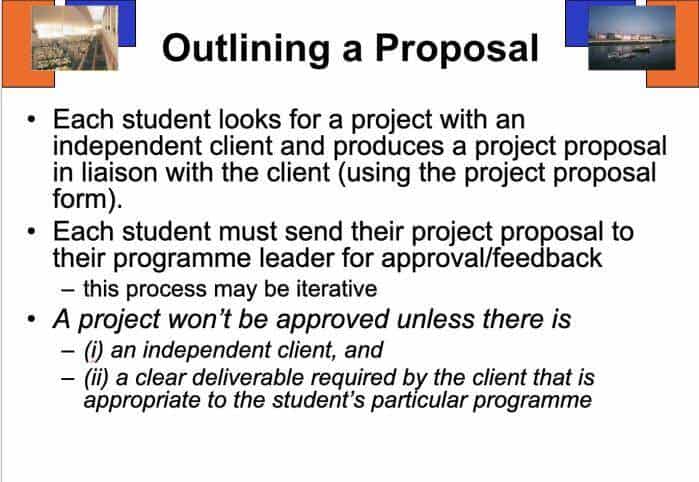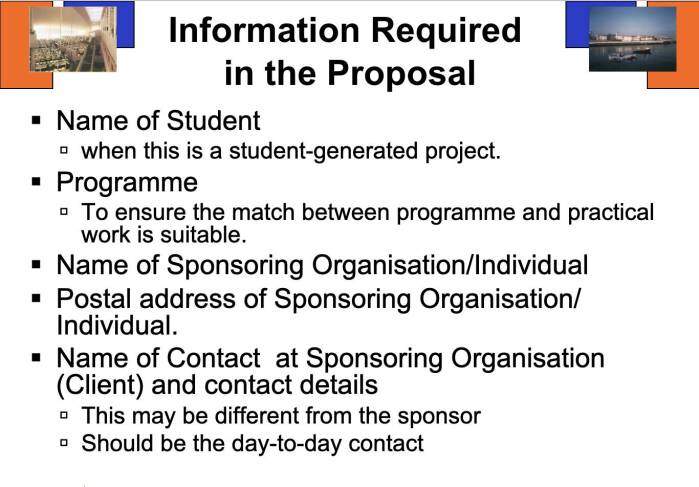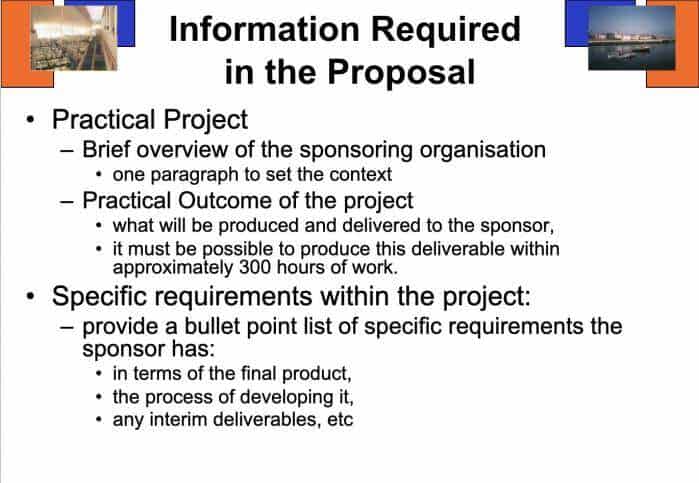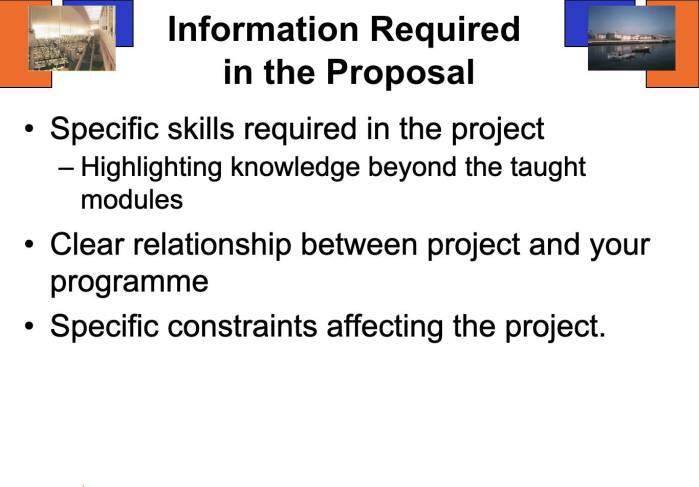How to Write a Final Year Project Proposal
It’s your final year in college and as usual, the faculty would require that you conduct a research project. But before you begin the research, you would need to write a project proposal.
Note that a project proposal is not the same as a research project. While a research project is a document that is written by a student at the end of an academic degree; in this case, an undergraduate degree, a project proposal is a type of work that represents the basic plan of how the student hopes to accomplish the research goals of his final year project. The project proposal would contain a surface study on the research project.
A good research proposal is very useful in organizing time and resources to complete your final project in a way that ensures your objectives are realized.
Writing a project proposal is not as difficult as most people think. The difficult part is usually knowing what topic you want to base your final year research on. Once you have done this, the other things become easier. The Key to picking an awesome project topic is concentrating on the current problems in society and trying to find a topic in your field of study that would solve those problems.
After you have picked a topic, the next thing you should do is research that topic and understand what the topic entails. You should publish papers centred on your topic. This will enable you to understand what path your research work should follow based on its format. Now, you can begin the process of writing your research proposal.
Steps to follow to write a proposal for your final year project.
Abstract
This is the first part of any final year research project proposal. It should be brief, clear, and easy to understand. The abstract explains what you will be doing, how you will do it, and why you are doing it.
Introduction
The introduction contains the background of your research proposal. It explains the problems your research would be solving. It also describes the practical approaches you’d be using to solve these problems. Your introduction should also be able to explain how the problems relate to your field of study. Your introduction should be easy to understand and should be backed up with facts. Try to make it engaging research. Don’t be boring.
Purpose of the study
The goals of your project topic should be clearly defined in this section. You should be able to provide practical reasons why you think this project is important. This section will state hypotheses that need to be tested and questions that are to be answered by your research. You should begin this section with the statement ‘the purpose of this study is…’
Methods
In this section, you would provide a detailed explanation of your intended research approach. You would need to state whether it would be quantitative or qualitative research. These are the methods you will use to prove your hypothesis. This section will also discuss the important variables that you will test to prove the validity of your hypothesis.
Instruments
This section will describe the type of research instruments you would be using to conduct your research. The research instruments maybe interviews, questionnaires or experiments. In some cases, research may require more than one research instrument. The key to choosing a research instrument for your research is understanding your research topic and the questions your research poses. Your research instrument must enable you to gather the data needed to answer your research questions appropriately. Most undergraduate projects in the science department use experiments while the humanities and arts use questionnaires more often than not.
References
This is the last part of your research proposal. All academic writings require references and citations. This shows the readers that you value the work done by others that have helped you formulate the research proposal. It also shows the readers that you understand your project topic. Citations should include the names of authors, the title of publication, date of publication and depending on your referencing style and any other necessary information.
I advise against writing the limitations of your research project in your proposal because you have not done the research, so you may have no backings to show that it is an actual limitation. So, unless your faculty says otherwise, do not include it in your project proposal. I will also recommend that you consult the guidelines for writing a research proposal in your faculty before you begin. Some faculties have specific criteria they look out for in a research proposal.
When you are done writing your research proposal, proofread it and ensure that it is free from grammar, punctuation and spelling errors. You can proofread by using a grammar or spelling checker. Such checkers are available online.
Final Year Project Proposal Sample format
Student Number and Name of Student:
Your Name
Programme:
(E.g) MSc Project Management
About this proposal sample
It is for you to use to outline idealise dissertation/project ideas for discussion in class and peer review, before producing your actual proposal.
Your topic cannot just be about a project that you will work on for a client.
Therefore, please remember that your proposed topic must be linked to project management or managing projects.
Further, your output must also be linked to project management or managing projects.
It is expected that this document the extent to be two pages when you have completed it.
Dissertation Subject Area (note this is not the title):
This dissertation’s subject area is scrum methodology, an agile process that is used for project implementation.
Your Dissertation/Project Idea
How is this idea explicitly linked to project management?
Scrum methodology is a popular approach to project management. Scrum methodology was designed with the intent of making software development project management easier, quicker and smoother. Naturally, investigating the strongholds and shortcomings of scrum is a topic that is at the heart of project management.
A general overview of your idea
Scrum methodology has many well-documented advantages over other forms of project implementation techniques and this has seen it adopted to a point where it is the dominant project implementation technique. The method is however not without its disadvantages. The dissertation will investigate the quantitative face to these two sides of the scrum, to help project implementers understand the exact dynamics that give scrum its perceived edge over other agile and non-agile methodologies.
What is your research objective?
The objective of this research is to establish using existing peer-reviewed literature and where possible with empirically supported evidence the advantages and weaknesses that Scrum methodology when it is used in software development project implementation, particularly in agile projects.
What is your research question/s?
1. What aspects of project implementation improved/ worsened as a result of the introduction of scrum methodology?
2. What challenges have project implementers faced in transitioning from traditional systems to scrum?
3. Is there empirical data that supports the documented advantages and disadvantages of scrum methodology?
What will be the output of the research?
The actual output of the research will be an empirical model that explains the convenience that scrum offers different stakeholders in project implementation. The model will hopefully offer insight into ways of improving the efficiency of the scrum. Additionally, combining scrum with other forms of project implementation can help improve scrum and this research could provide a specific formula for integrating these methodologies efficiently.
How will the data required to produce the output be collected?
The data will mainly be collected from various library resources including books and peer-reviewed journal articles. By scouring through such resources, valuable statistical and qualitative information will emerge and draw a discernible pattern that points to the strong points and shortcomings of the scrum. Additionally, data of a more firsthand nature will be gathered through interaction with the technical project managers involved in implementing projects by using the scrum technique. This will be done mainly through interviews.
What will be the main focus of your literature review?
The focus of the literature review will be specific case studies that indicate how scrum improved or worsened different aspects of a project’s implementation with appropriate and valid academic references to support the studies. Through the harmonization of the emerging topics, different metrics regarding scrum will hopefully emerge.
What do you envisage could be areas of difficulty with this dissertation/project idea?
Acquiring quantitative data regarding the success of scrum technology could be a tough challenge owing to the scarcity of authoritative research mainly aimed at achieving this end. Finding case studies that specifically focus on scrum could also be a problem, again arising from the lack of literature on the issue.
Please state any specific resources that will be provided for the project
1. Client Information.
2. Travel Expenses (When necessary).
3. Email and Skype.
4. Library resources.
5. Science direct for Academic journals.
Any other comments:
During the filling of this form, the dissertation is still in the early stages of preparation. As such, a well-defined outline of the final product and the process of getting there has yet to take shape. At this stage, many of the details required in this form can only be provided speculatively to some extent and will only emerge clearly through a progressive learning process in the course of the project.





If you like this article, see others like it: